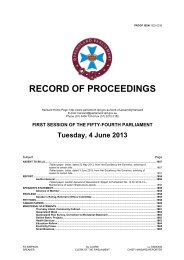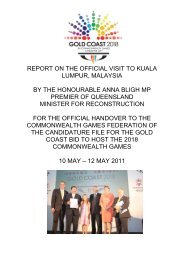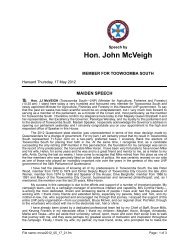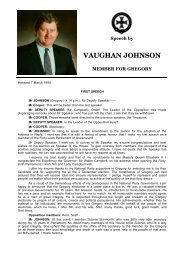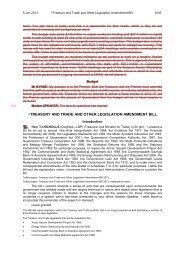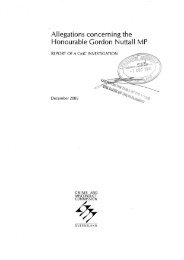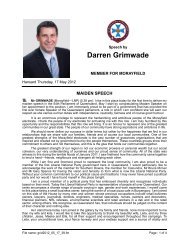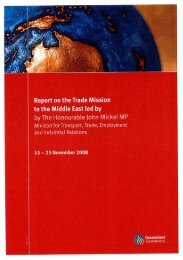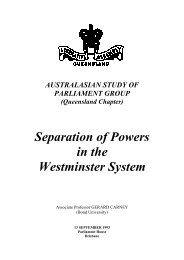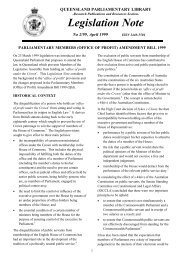weekly hansard - Queensland Parliament - Queensland Government
weekly hansard - Queensland Parliament - Queensland Government
weekly hansard - Queensland Parliament - Queensland Government
Create successful ePaper yourself
Turn your PDF publications into a flip-book with our unique Google optimized e-Paper software.
2568 Matters of Public Interest 23 Aug 2005<br />
across <strong>Queensland</strong>. I encourage all people to join in, have some fun, laughter and enjoyment with our<br />
seniors.<br />
I hope that our seniors will obviously have good health and improve in their health outcomes. As a<br />
person who is only three years away from being a senior, I hope that, along with my colleagues, we will<br />
have a long and healthy retirement hopefully free of ailments, disease and disability.<br />
Mr DEPUTY SPEAKER (Mr Fouras): Order! Before calling the member for Algester, I say that<br />
I am already a senior so I can absolutely understand what you are saying. The member for Algester.<br />
International Conference on Engaging Communities<br />
Ms STRUTHERS (Algester—ALP) (11.54 am): Last week I was pleased to speak at the<br />
<strong>Queensland</strong> government and United Nations first International Conference on Engaging Communities at<br />
the Brisbane convention centre. I would like to begin by congratulating the organisers of this event,<br />
particularly the Department of Communities and the organising committee. It was a huge success. It<br />
was an amazing conference with more than 1,800 delegates from all over the world including a very<br />
sizable contingent from Asia, India, Sri Lanka and other such countries. It was great to see so many<br />
people coming to this first international event.<br />
What struck me was that many people from all over the world were discussing ways in which<br />
citizens can be more actively involved in democracy and in decision making, but many millions of people<br />
from those countries do not even have a decent roof over their head. They do not even have decent<br />
access to water or food. They do not have jobs and incomes. There were lots of differing needs<br />
discussed because in <strong>Queensland</strong> we have a Department of Communities and we have a Community<br />
Engagement Division. We have high-level processes for consultation and engagement that are the envy<br />
of many overseas people. It is very hard to reconcile where we are at with our processes and where<br />
other countries are at, with many of them being so oppressed. In Zimbabwae and other countries, for<br />
instance, the people do not have a say in government at all. That government uses violence to stop<br />
people from voting. The differences are very stark. But it is a great credit to the <strong>Queensland</strong> government<br />
and the Department of Communities that we have very solid processes in place. We have one of the<br />
most advanced and stable democracies in the entire world.<br />
As the Premier has outlined in this parliament before, we have had over 31,000 people attend our<br />
community cabinet meetings. That is a brilliant concept. The response by participants at the community<br />
engagement conference to this concept was amazing. They could not believe that leaders of the<br />
government, including the Premier, would face the music in the way that they do every four to six weeks<br />
in a public forum of that nature. Where people from other countries do not even get to say at all—where<br />
they are violently oppressed from having a say—they found these processes so amazing and<br />
something they would probably never dream of in their own lifetime.<br />
They were in awe of our regional forums and all those sorts of activities that we have here such<br />
as the e-democracy processes. Twenty-two thousand people have signed e-petitions. Eight thousand<br />
people attended the first regional parliamentary sitting in Townsville in September 2000, and we are all<br />
very confident that a similar number of people will attend the upcoming Rockhampton parliamentary<br />
sitting. Again that is an opportunity for people in regional areas in <strong>Queensland</strong> to meet and greet<br />
members, to have a very direct say and to have an opportunity to talk with the Premier, the ministers<br />
and other members of the government. Importantly, our strategies ensure that all people from all walks<br />
of life have an opportunity to have their say, including people who come from marginalised and<br />
disadvantaged backgrounds.<br />
Today <strong>Queensland</strong>ers have unprecedented access to their government and ministers. It was<br />
just amazing to see the differences in governments. In fact, I felt very proud of what we are achieving<br />
here. I know there are always problems. No government ever reaches out in the way that all people<br />
would like, and no government makes decisions that all people would like because people differ in their<br />
own views, but we certainly have processes for consultation and processes for engagement that are the<br />
envy of the world.<br />
One of the greatest challenges though, and what I spoke about, was the need for people to<br />
actually participate actively in political processes including political parties. In Australia and throughout<br />
the world, party membership has declined. For instance, in the sixties it stood at about four per cent of<br />
the population in Australia. This has declined to two per cent. That is the common trend across OECD<br />
countries. The greatest challenge is getting young people involved. A survey of young people in 1987<br />
found that those aged 18 to 24 said that they had not much or no interest in politics. In 2000 that figure<br />
had risen to more than 50 per cent. I look forward to the findings of the parliamentary inquiry that we are<br />
having into how we can all better engage with young people. These findings will be very important<br />
because it is certainly young people’s voices we need to hear more of, and it is young people’s voices<br />
that need to be included in the decision making. We certainly have a lot of work to do in that regard.



